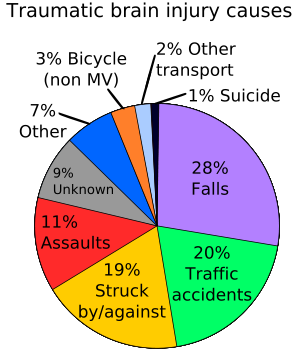This entry is an overview of what is involved in recovery and rehab for a TBI victim. Chances are that you know someone that has experienced a TBI. Peppered throughout the information are links to sites that contain more details on each topic.
Obviously the medical team will address any physical injuries that require attention. Something to keep in mind about that though, is that a mild TBI (mTBI) or closed head injury may not be diagnosed until well after all of the physical injuries have been tended to. Refer to the
TBI Part III - Types for more info about those.
Before recovery/rehab can occur, there has to be a diagnosis of the type or level of TBI has occurred. The victim may be on life saving medical machines, medicated
and the evaluation for brain injury will be hard to determine until the victim is physically stable and conscious. Remember, a TBI is not "visually apparent" because it happens inside the head. This is
most apparent in a "closed head injury" (explained in
TBI Part II). As explained on one website [click
HERE] there are several steps in the "method" of diagnosis:
- A detailed neurological examination will bring out evidence of brain injury.
- Brain imaging with CAT scan, MRI, SPECT and PET scan.
- Cognitive evaluation by a neuropsychologist with formal neuropsychological testing.
- Evaluations by physical, occupational and speech therapists help clarify the specific deficits of an individual.
Once a diagnosis has been made, a plan for recovery and rehab can be penciled on paper. Of course it will cover any of the physical injuries, but the "length" of the rest of it depends on the individual victim and the success they achieve. It becomes a thought that "only time will tell." For a concussion or mTBI, the victim is typically discharged within a time span of a few hours up to a day after the injury occurs. For more severe types, they may be held in the hospital until they are physically stable and then transferred to a rehab center that specializes in TBIs. For example, I was in 2 different hospitals 2,100 miles from "home" before I was stable enough to transfer to a rehab center that was closer to my house.
So, the question that comes to mind of the family or friend of a TBI victim, is "
OMG, what happens at the rehab center?!?!" I'll summarize what can be found on this website [
link]. I'm glad you are reading this, but not to be sarcastic, if you are ever checked into a TBI center, you won't remember this or be aware of it until you recover. This is more for the family and friends of a victim. I've highlighted the key points of what happens after the physical things are tended to and the victim is finally in a true TBI center. I've put my personal observations after.
Similar to the
acute care facility, the TBI patient will be cared for by a team of
professionals who specialize in the care of trauma victims. Their goals are to:
- Stabilize the medical and rehabilitation issues related to brain injury and the other injuries.
- Restore lost functional abilities.
- Provide adaptive devices or strategies to enhance functional independence.
- Begin to analyze with the family and the patient what changes might be required when the person goes home.
Each day, the patient will participate in therapy. Initially, the
patient may require staff assistance for even the most simple
activities: brushing teeth, getting out of bed and eating. The patient
also may require staff for safety because there is a risk of falling,
eloping (trying to get out of the hospital to go home) or getting hurt.
The patient may be confused and forgetful.
The Rehabilitation Team
The
Physiatrist is the team leader in the rehabilitation program.
The physiatrist is a physician specializing in physical medicine and
rehabilitation. The physiatrist will assess and
prescribe the treatment and direct the team.
The Neuropsychologist will assess patient's changes in thinking and
behavior. Changes could include:
- Poor memory, attention, concentration, decision-making
- Impulsivity, disorientation
- Language and communication abilities
- Inability to speak or understand when spoken to
Many patients are unaware of the changes in the brain and how
those changes affect their daily lives. A patient may not understand
what has happened and may be distraught by being away from home.
The Rehabilitation Nurse assists patients with brain injury and
chronic illness in attaining maximum optimal health, and adapting to an
altered lifestyle. The focus of nursing care is on:
- Sleep pattern disturbance
- Impaired verbal communication and comprehension
The Physical Therapist job is to minimize or overcome paralyzing effects
related to the brain injury. PTs will assess:
- Balance, posture, strength
- Increased sensation of sensory-motor activities
- Pain management
The Occupational Therapist assesses functions and potential
complications related to the movement of upper extremities, daily living
skills, cognition, vision and perception. OTS help determine the best ways to perform daily living skills including
showering, dressing and personal hygiene. The OT also will look at skills to prepare the patient for a return to the home. These skills include:
- Cooking, grocery shopping
- Banking, budgeting
- Readiness for returning to work by assessing prevocational and vocational skills
Now a personal explanation of being released and being allowed to return "home." The victim of a TBI will only be released from the rehab center once they can demonstrate that they are capable of performing all of the above (and more). They will also have to schedule the follow up assessments, to make sure they are progressing down the path of life, and not experiencing a "relapse." It takes months to "recover" from a severe TBI, but years to "rehab."
Personal Observations
✔ You have to go through physical therapy for a few reasons. Your muscles may be weak from being immobile. Second point is because of how your brain is "misfiring." Physical therapy is to get your muscles active again, but also because the damage to your brain means that it doesn't send the signals to the muscles to be active. You will walk A LOT, perform hand/arm/leg exercises, etc. I studied tai chi,
qi gong, do yoga, walk my dog about 20 miles per day, and became a roller derby ref. I stay very active.
✔ Another thing not discussed openly is trying to "elope" or "get away" from where they are. When you become conscious again, and don't know where you are or why you are there, the survival instinct kicks in. You want to "flee." But know, the TBI victim may be restrained to prevent it. It stops more injuries from occurring until the person is able to safely conduct a "normal" demonstration of getting through the day. A lot of TBI victims may spend some time cuffed or strapped to their bed to prevent them from trying to get away until they are conscious enough to understand that they shouldn't.
✔ Another point is related to rehab exercises to regain the ability to communicate. They will track your ability to communicate, but the don't really provide therapy to assist. You have to do it on your own. I suggest playing cards, doing crossword puzzles, sudoku, word finds, read the newspaper, etc. Just letting a TBI victim watch TV or listen to the radio doesn't do it because it doesn't challenge the brain.
✔ I highlighted the rest of the points just to give you a summary of what a TBI victim will be analyzed on before they are "released" to go home. What isn't really "discussed," is what your restrictions will be when released. You may not be allowed to drive, go up the stairs, use hand tools, be alone in the bathroom, go anywhere unsupervised, cook, clean, etc. It all depends on what level of success you have at the rehab center and at follow up appointments, before they begin to remove your restrictions..
✔ Another thing not mentioned in rehab is how some other things in your body may change. They will tell you that your sleep patterns may change (you may need less or more), but they don't tell you that your metabolism and hormone levels may also change. The only way they mention the hormone changes is to say that "you will be more impulsive and/or uninhibited in your expressions of your feelings." Yeah, sorry to say, but THAT affects everyone around you. Same with metabolism. You may need MORE or even maybe LESS meals.
I could probably write a novel about my personal experience and observations, but I just wanted to provide some overviews about traumatic brain injuries and concussions so more people would begin to learn more about them. There are 1.5 million cases every year... that's a LOT. And those are only the counts of the victims that are checked into a hospital. If you receive a concussion, go to the ER, and are released shortly after, you don't count because it isn't reported. So, ask yourself, how many concussions occur that aren't counted in the stats? Hmmm... makes you wonder... Just be careful out there...
Related Links:


